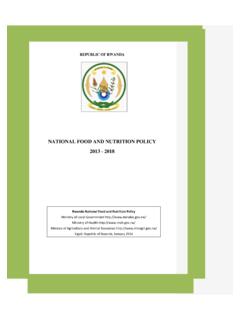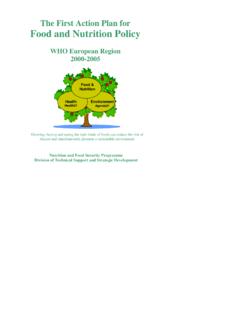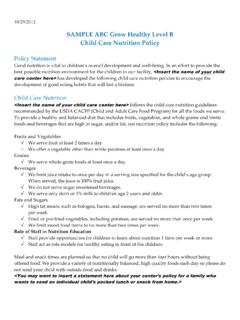Transcription of National Policy on Food and Nutrition in Nigeria NATIONAL ...
1 Produced by: Ministry of Budget and NATIONAL Planning 2016 NATIONAL Policy ONNATIONAL Policy ONFOOD AND NUTRITIONFOOD AND NUTRITIONIN NIGERIAIN NIGERIAB read, other cereals, and potatoesFruit andvegetables Milk and dairy products food containingfat and foodscontaining sugarMeat, fish andalternatives CHAPTER NATIONAL food and Nutrition Policy is a document that provides the framework for addressing the problems of food and Nutrition insecurity in Nigeria , from the individual, household, community and up to the NATIONAL level. It guides the identification, design, and implementation of intervention activities across different relevant sectors. Nutrition is a multi-sectoral and multi-disciplinary issue involving various sectors including health, agriculture, science and technology, education, trade, economy, and industry. In recognition of this, various sectors in Nigeria have developed policies and strategies to address the Nutrition perspectives of their mandates.
2 These documents NATIONAL Health Policy and Guidelines; NATIONAL Agricultural Policy ; Agricultural Transformation Agenda; , Technology, and Innovation Policy ; Policy on Education; Policy on School Health; Policy on Infant and Young Child Feeding (IYCF); Child Care and Development; Population Policy ; Policy on HIV/AIDS and OVCs; Policy on Non-Communicable Diseases; Policy on Gender Mainstreaming; Policy on Security; Policy on food Safety and its Implementation Strategy Policy on Adolescent Health and Development in these policies, strategies and programmes, the multi-sectoral and multi-disciplinary nature of Nutrition makes the coordination of food and Nutrition activities a challenge. In 1990, a NATIONAL Committee on food and Nutrition (NCFN) was established and domiciled in the then Federal Ministry of Science and Technology, to, among other things, coordinate food and Nutrition actions and formulate a NATIONAL food and Nutrition Policy , with a NATIONAL Plan of Action.
3 The phasing-out of that ministry in 1993 led to the transfer of NCFN to the Federal Ministry of Health (FMOH). In 1994, the NCFN and emerging programmes were relocated to the NATIONAL Planning Commission (NPC) now known as Ministry of Budget and NATIONAL Planning (MB&NP) because of its unique position as the government agency responsible for coordination and monitoring of all NATIONAL policies and programmes, including budgetary processes, as well as all technical assistance in the country. 11 The first NATIONAL food and Nutrition Policy was developed through a multi-stakeholder process and produced by the NPC in 2001. However, this Policy had little or no effect in bringing about improvement in the Nutrition situation in Nigeria due to the fact that the Policy and the plan of action arising from it were not adequately implemented. This has been due largely to poor funding as well as ineffective coordination and monitoring of the Policy implementation.
4 Emerging concerns in the science, practice and programming of food and Nutrition activities informed the review of the Policy . Some of these emerging critical issues include Nutrition in the first one thousand days of life, Nutrition during emergencies and upsurge in the prevalence of diet-related non-communicable diseases. Similarly, there is increasing recognition of Nutrition as a necessary condition for NATIONAL development as espoused in the Millennium Development Goals (MDGs). It is also worthy to note that the post-2015 Sustainable Development Goals (SDGs) require actions that will promote Nutrition in NATIONAL urgent need to scale up high-impact and cost-effective Nutrition interventions, amplified by Nigeria 's recent sign up with the Scaling Up Nutrition (SUN) movement in 2011 further justifies the need for the review. Adequate food and optimal nutritional status are the foundation blocks for the building of healthy, secure lives and thus form the basis for development in any nation.
5 It is well-known that the basic cause of the food and Nutrition problem is poverty entrenched in the mechanisms of governance and institutions which drive the economy. Conceptually, malnutrition in Nigeria arises from poverty, gaps in governance and institutional weaknesses as basic causes whilst food insecurity, inadequate care and access to health services are underlying causes and inadequate food intake and diseases are the immediate spite of Nigeria 's abundant natural and human resource endowment, poverty has remained pervasive, multifaceted and chronic. Given the most recent data available, it is estimated that approximately 39% of Nigerians live below the poverty line (MDG 2013 report). Children from the poorest economic quartile have been shown to be four times more likely to be malnourished than children from the richest households (Multiple Indicator Cluster Surveys [MICS, 2011]. Thus, analysis of the current food and Nutrition situation needs to recognise the effects of poverty and make realistic projections of how the goals and objectives of poverty-reduction efforts, including the macro-economic framework, will affect the achievements of this revised Policy .)
6 food insecurity is closely linked to hunger and malnutrition, whilst malnutrition is the most serious consequence of food insecurity. The nature and extent of hunger and food insecurity in Nigeria are of public health concern. Available data showed that total average household expenditure on food for and Nutrition Situation in Situation in SecurityNational Policy on food and Nutrition in NigeriaNational Policy on food and Nutrition in Nigeria22 NATIONAL Policy ONNATIONAL Policy ONFOOD AND NUTRITIONFOOD AND NUTRITIONIN NIGERIAIN NIGERIAM inistry of Budget and NATIONAL Planning Plot 421 Constitution AvenueCentral Business Immune Deficiency SyndromeARVAnti-retroviralBCCB ehaviour Change CommunicationBMIBody Mass IndexBMSB reast Milk SubstituteCAADP Comprehensive African Agriculture Development ProgrammeCBOsCommunity-Based Organizations CMAMC ommunity Management of Acute MalnutritionCSOsCivil Society Organizations DFIDD epartment for International DevelopmentENAE ssential Nutrition Actions FAOFood and Agriculture OrganizationFBOsFaith Based OrganizationsFMOHF ederal Ministry of HealthGARPRG lobal Aids Response Country Progress Report.
7 NigeriaHIVH uman Immunodeficiency VirusICNI nternational Conference on NutritionIDAIron Deficiency AnaemiaIDDI odine Deficiency DisorderIFPRII nternational food Policy Research InstituteIMAMI ntegrated Management of Acute MalnutritionIMNCHI ntegrated Maternal Newborn and Child Health ITPIn Patient Therapeutic ProgramIYCFI nfant and Young Child FeedingLBNSL iquid Based Nutrient SupplementLGAL ocal Government Area LGCFNL ocal Government Committee on food and NutritionLO-ORSLow Osmolarity Oral Rehydration Solution MAMM oderate Acute MalnutritionMBNPM inistry of Budget and NATIONAL PlanningMDAsMinistries Departments and AgenciesMDGsMillennium Development GoalsM & EMonitoring and EvaluationMICSM ultiple Indicator Cluster SurveyNational Policy on food and Nutrition in NigeriaNational Policy on food and Nutrition in NigeriaiiiiMNDCM icronutrient Deficiency ControlNAFDACN ational Agency for food and Drug Administration and ControlNBSN ational Bureau of StatisticsNCFNN ational Committee on food and NutritionNDHSN igeria Demographic and Health SurveyNFAN ational Fortification AllianceNFCNSN igeria food Consumption and Nutrition SurveyNFSPN ational food Security ProgrammeNGOsNon Governmental OrganizationsNCNN ational Council on Nutrition NNNN ational Nutrition NetworkNPCN ational Planning CommissionNPHCDA NATIONAL Primary Health Care Development AgencyNSHDPN ational Strategic Health Development PlanOTPOut Patient Therapeutic ProgramOVCO rphan and Vulnerable ChildrenPATHP rogramme for Appropriate Technology in HealthPLWHAP eople Living With HIV/AIDSRRAR apid Rural AppraisalRUTFR eady to Use Therapeutic FoodsSAMS evere Acute MalnutritionSBCCS ocial and Behavioral Change Communication SCISave the Children InternationalSCFNS tate Committee on food and NutritionSDGsSustainable Development Goals SMARTS tandardized Monitoring Assessment of Relief and
8 TransitionsSUNS caling up NutritionUNUnited NationsUNICEFU nited Nations Children's FundUSIU niversal Salt IodizationUSI-TFUniversal Salt Iodization Task ForceVADV itamin A Deficiency VPVice PresidentWHAW orld Health AssemblyWHOW orld Health OrganizationiiiiiiNational Policy on food and Nutrition in NigeriaNational Policy on food and Nutrition in NigeriaivivTable of Contentsiivvi113899991012223539 ABBREVIATIONS / ACRONYMS FOREWARD PREFACECHAPTER ONE: Introduction food and Nutrition Guiding Principles of the Policy CHAPTER TWO: Vision, Goal and Objective of the food and Nutrition Vision Statement Goal Objectives Targets CHAPTER THREE: Strategies CHAPTER FOUR: Institutional Arrangement, Legal Framework and FinancingCHAPTER FIVE: Monitoring and Evaluation Glossary of Terms NATIONAL Policy on food and Nutrition in NigeriaNational Policy on food and Nutrition in NigeriaForewordMalnutrition and Nutrition related issues continue to be of public health concern in Nigeria .
9 It manifests itself mainly as under Nutrition , over Nutrition and micronutrient deficiencies. Since the beginning of this decade, the close relationship between malnutrition and under-development has continued to be emphasized, particularly at the various international summits aimed at improving the welfare of women and children. An important conclusion that emerged from these discussions and in particular, from the 2014 International Conference on Nutrition (ICN2), held in Rome, was that nutritional well-being of all people is a pre-condition for development and a key objective of progress in human development. Therefore, reducing malnutrition is an important goal of development, since malnutrition not only slows development, it leads directly to suffering and death. The recent review of the NATIONAL Policy on food and Nutrition by the Federal Government of Nigeria is another major land mark in the effort of the present administration in addressing the problem of malnutrition, which has been most devastating among young children, pregnant and lactating mothers.
10 The Policy has been revised to add value and strengthen the synergy among sectors and other initiatives of Government and partners. It is expected that all other policies that have any bearing on food and Nutrition should be updated in line with this Policy . As a follow up to this, robust intervention programme and cost effective action plan is to be developed to drive the implementation of the Policy for effective in turn will lay a solid foundation for higher productivity and improved physical and mental development among the citizenry. With the approval of the Policy by the Federal Executive Council (FEC), I therefore recommend effective implementation of this Policy to achieve the objective of ensuring optimal nutritional status for all S. Ahmed (Mrs)Honourable Minister of StateMinistry of Budget and NATIONAL Policy on food and Nutrition in NigeriaNational Policy on food and Nutrition in NigeriaPrefaceMalnutrition has continued to remain a key health challenge in developing economies, including Nigeria .









